Charles E W Bean, Diaries, AWM38 3DRL 606/245/1 - 1915 - 1925 - Part 10
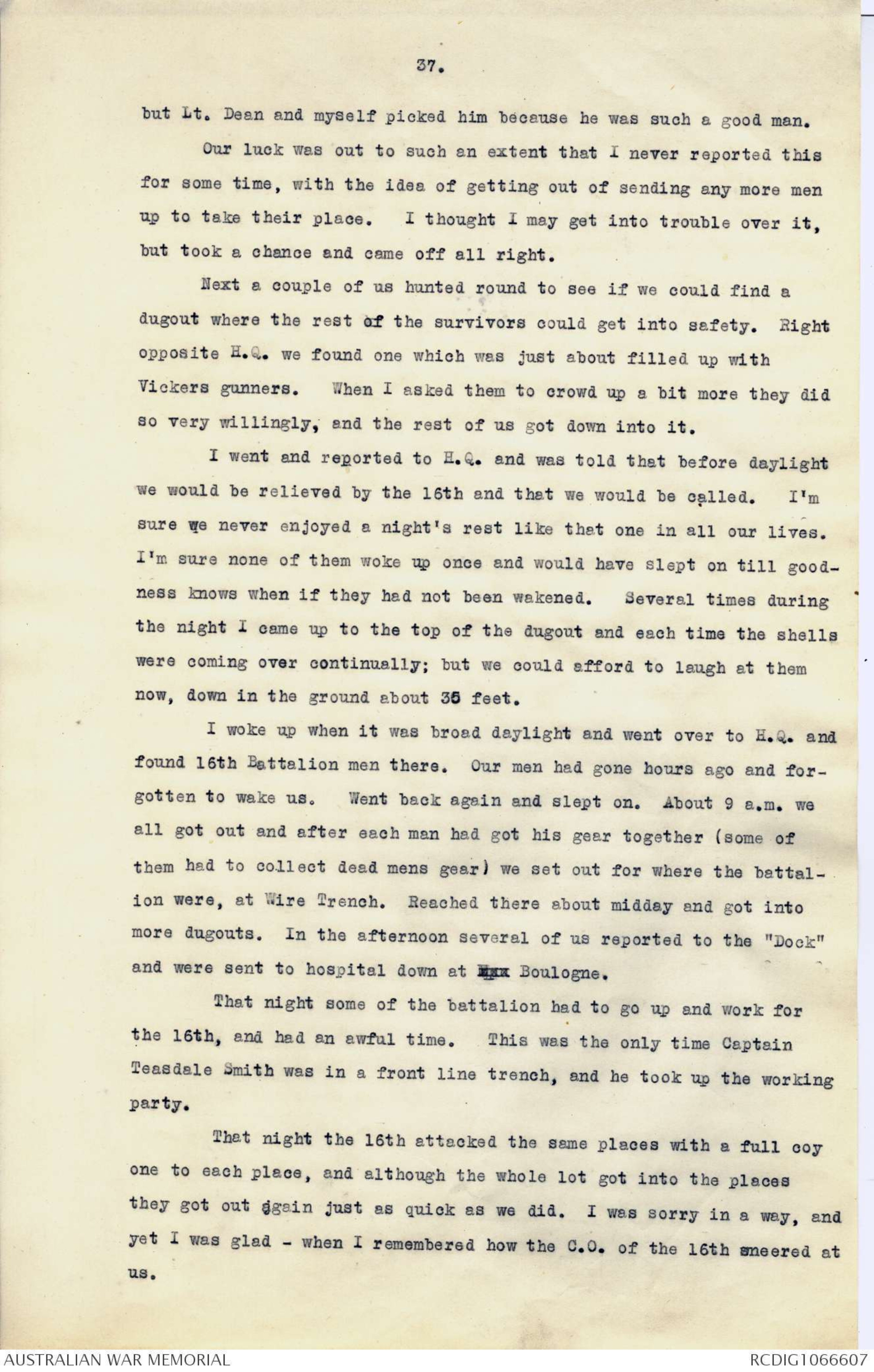
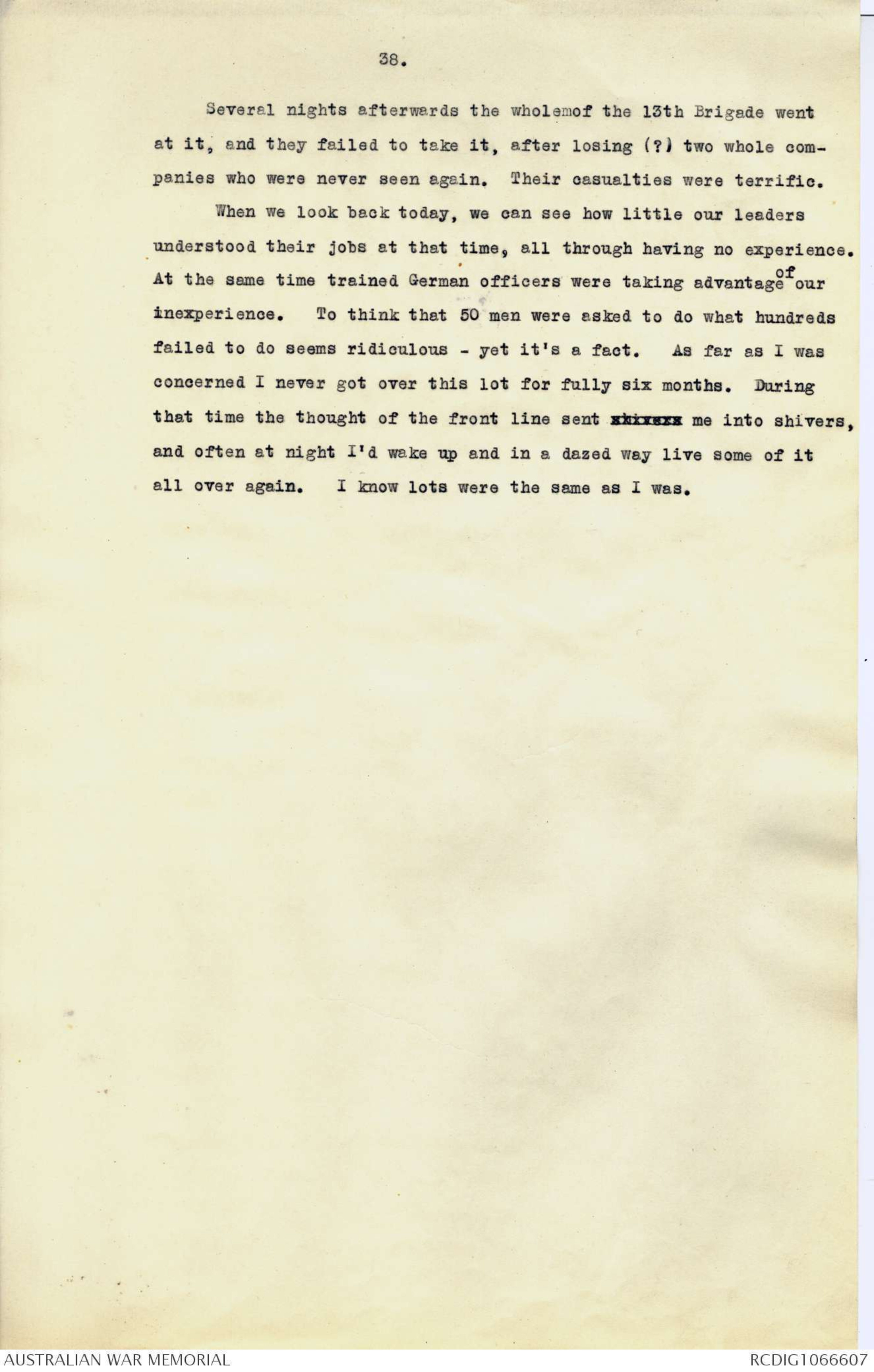
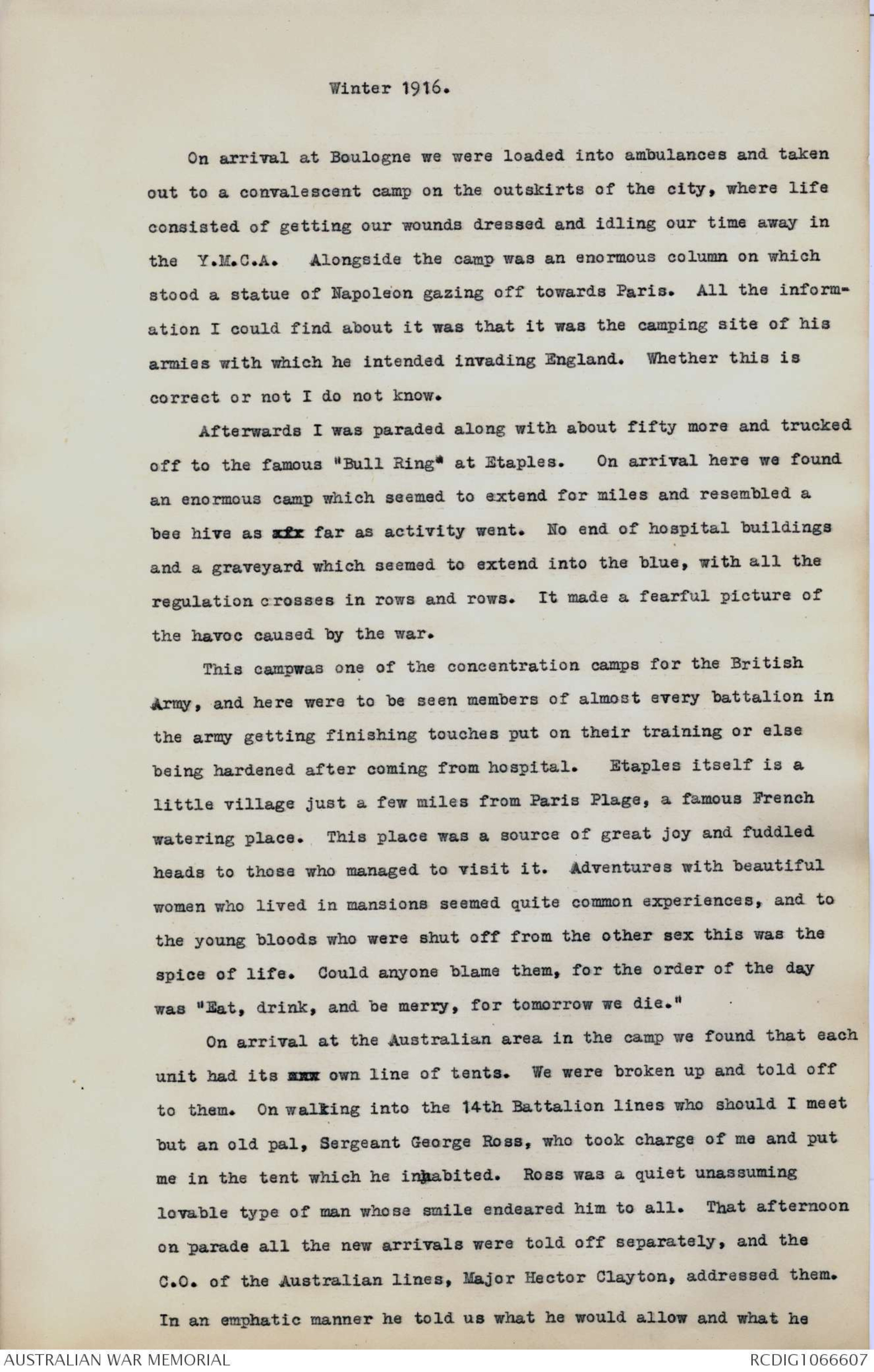
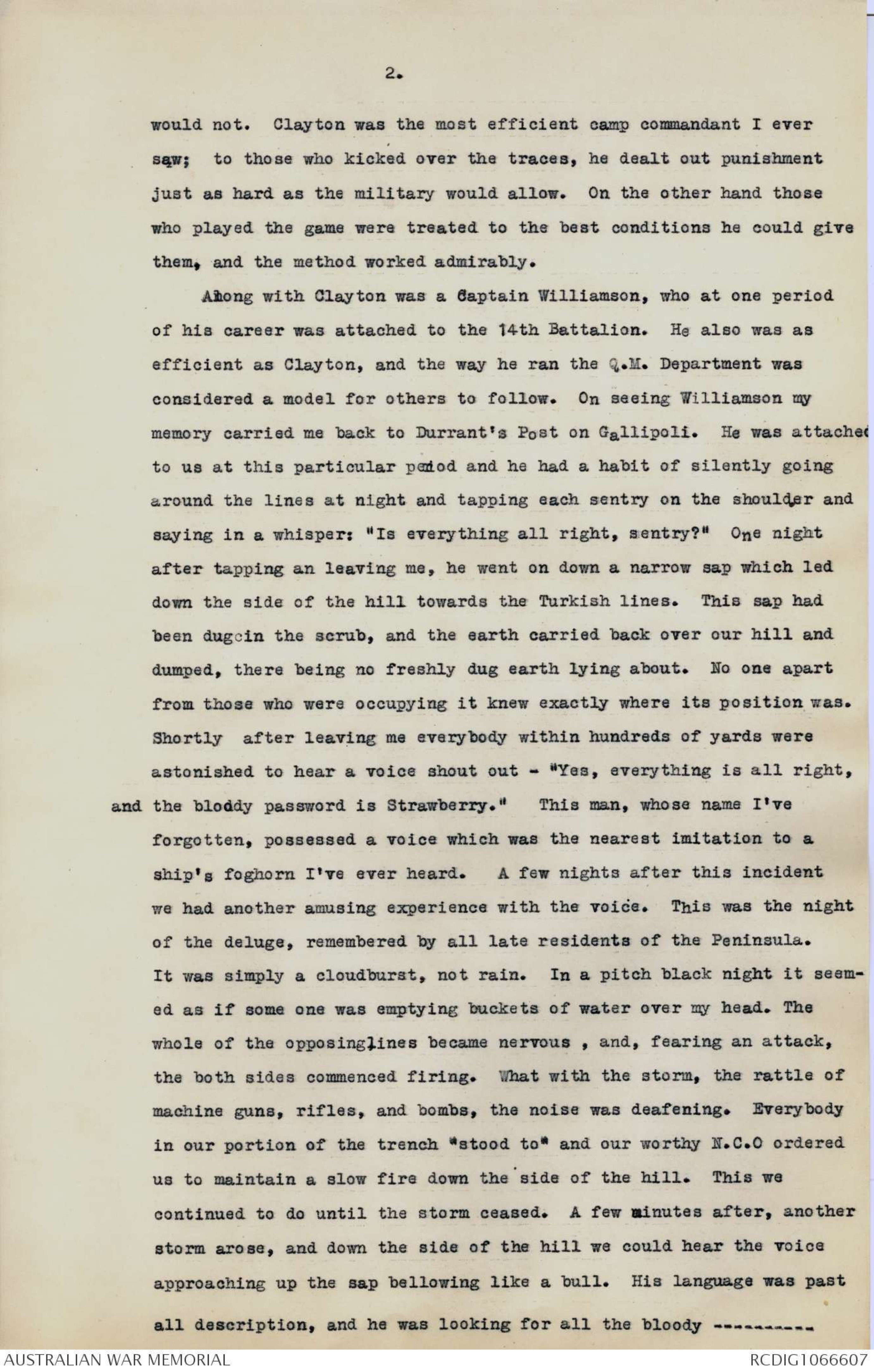
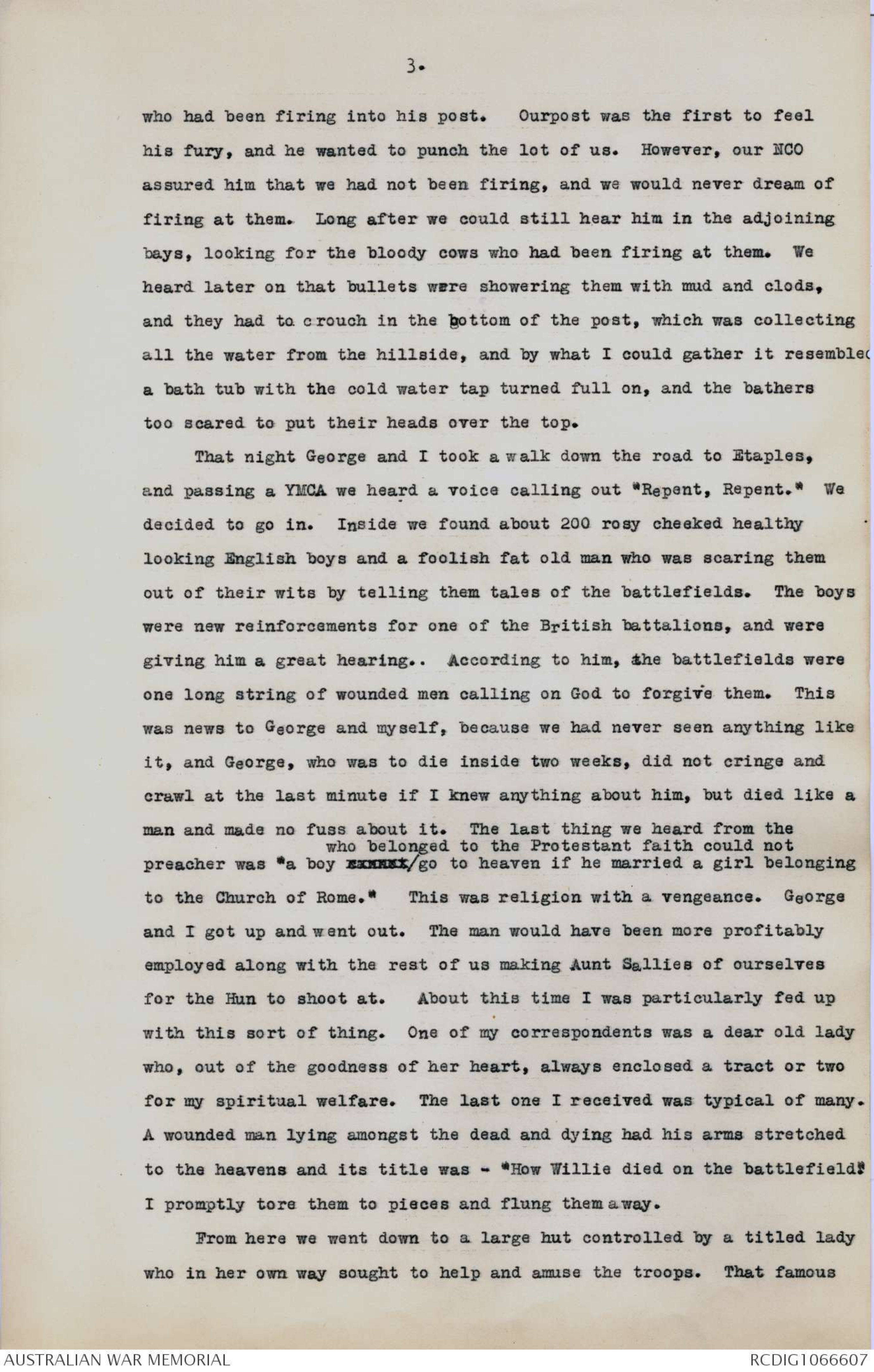
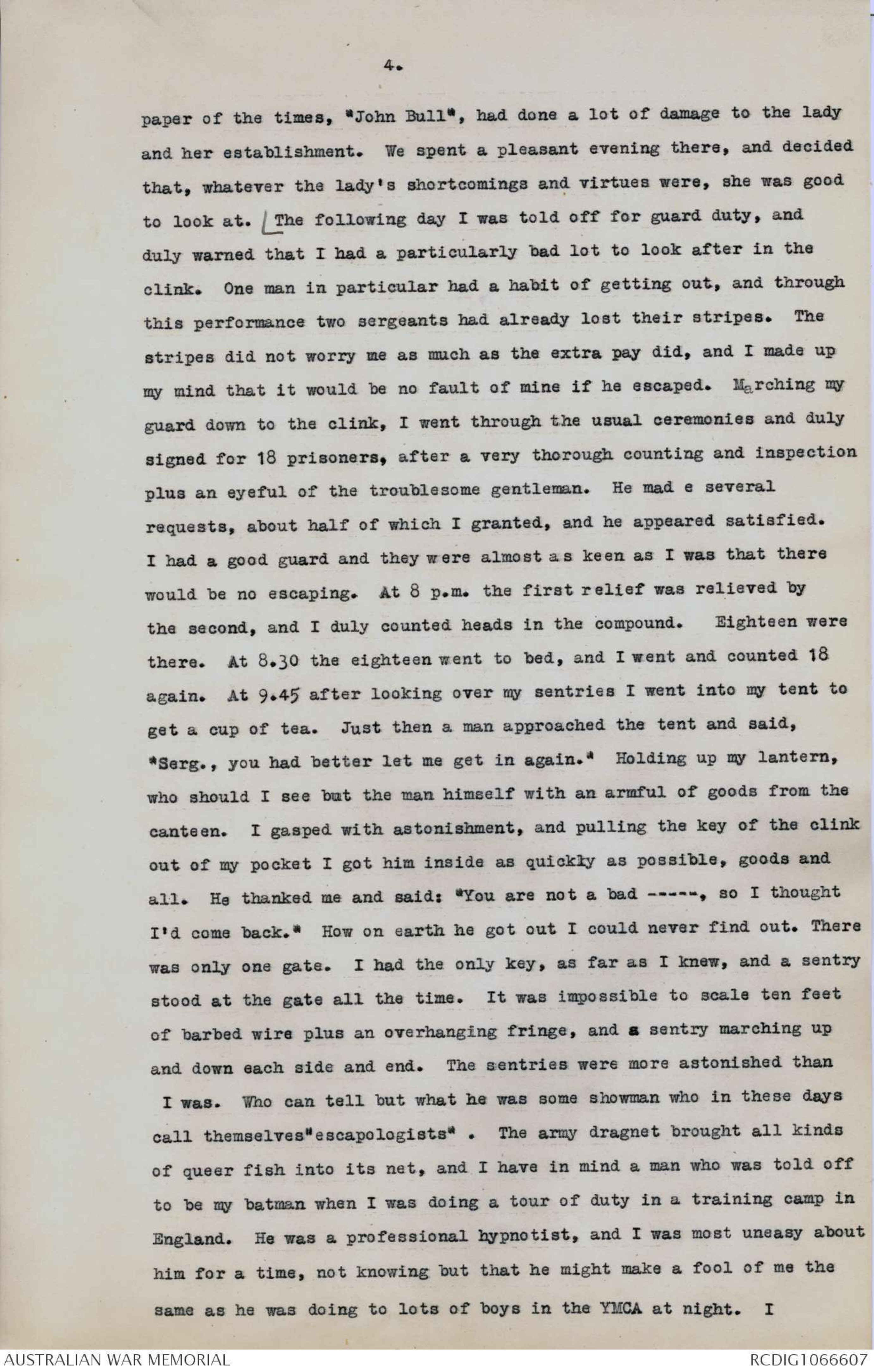
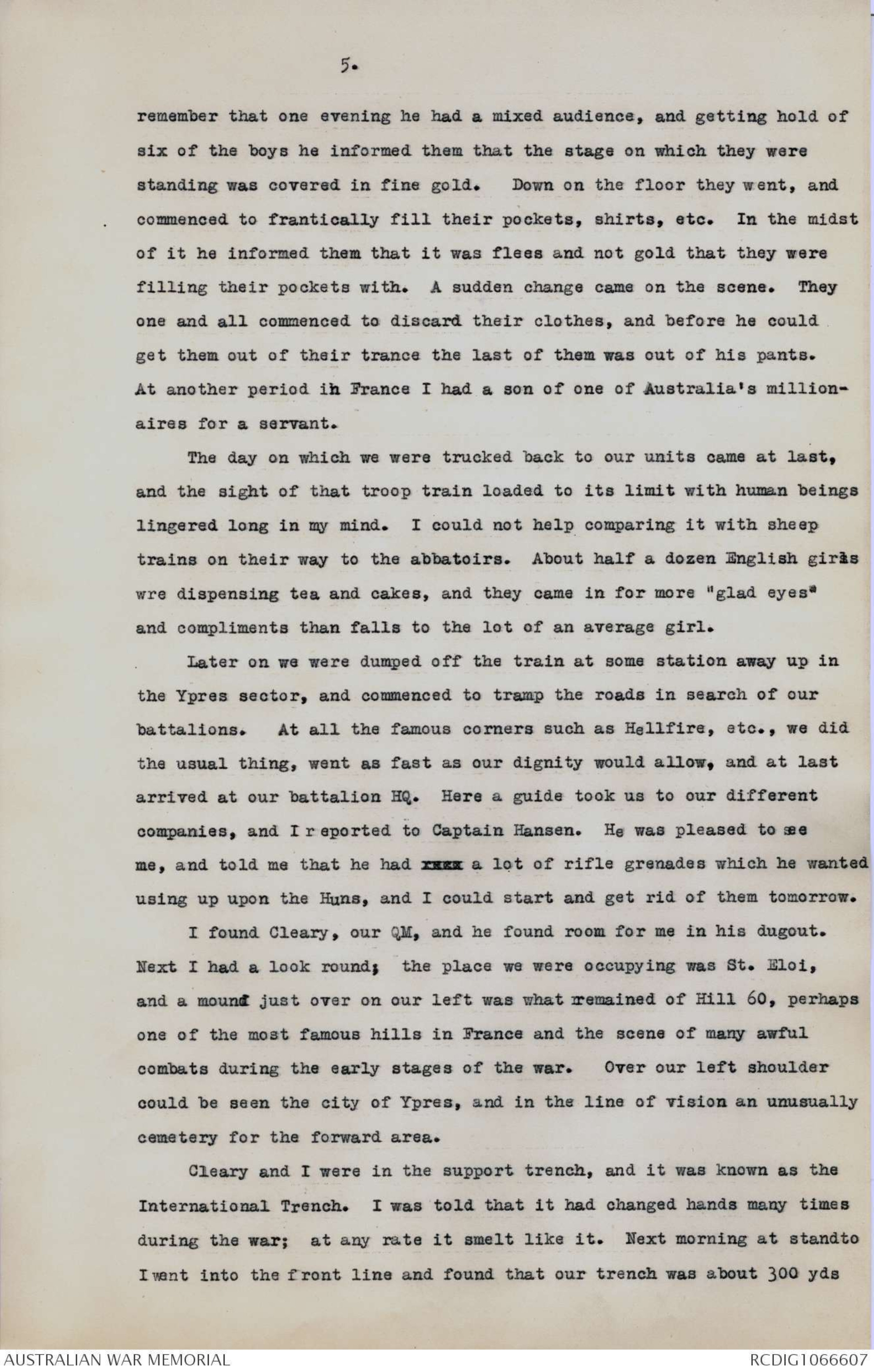
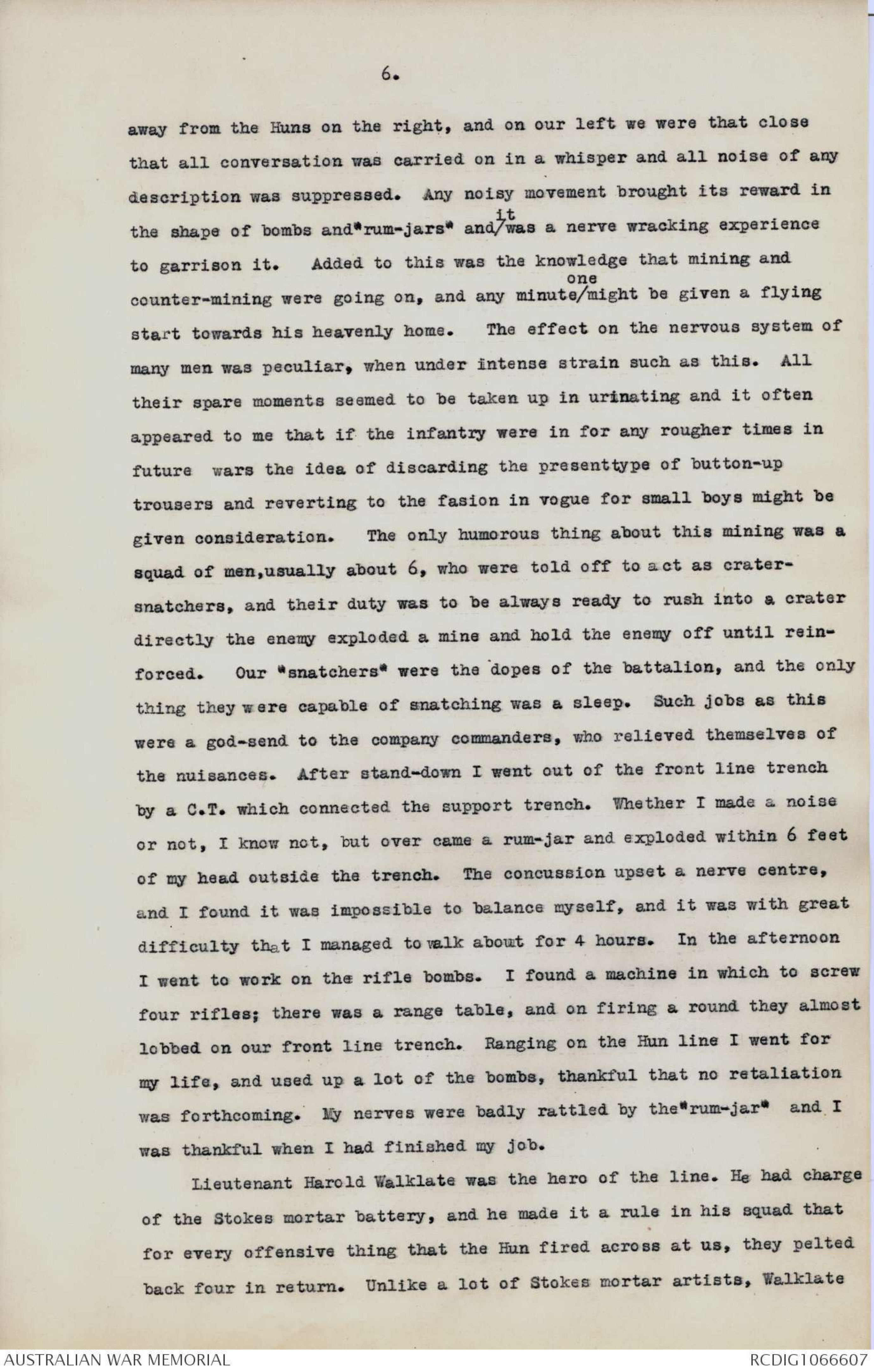
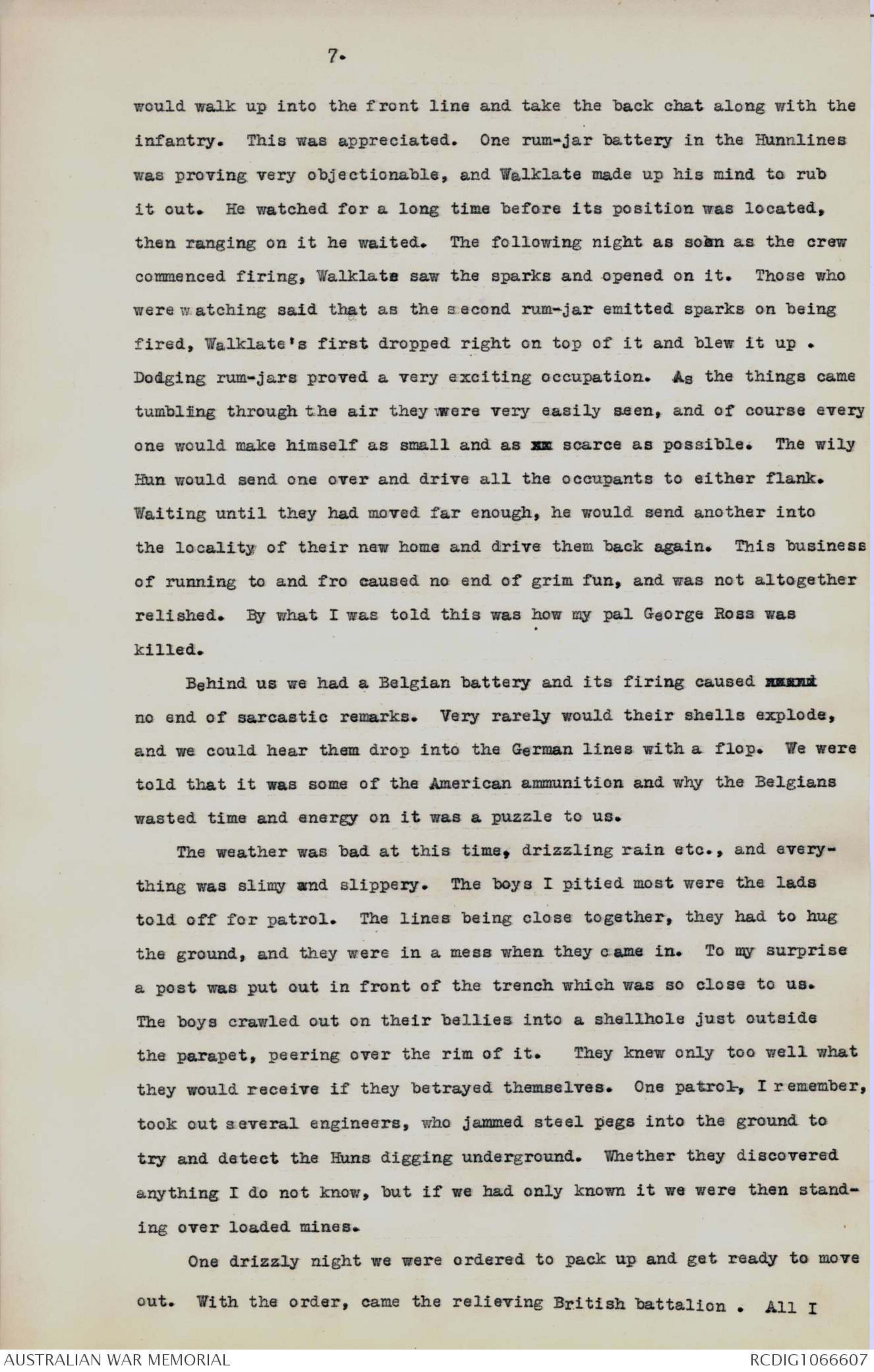
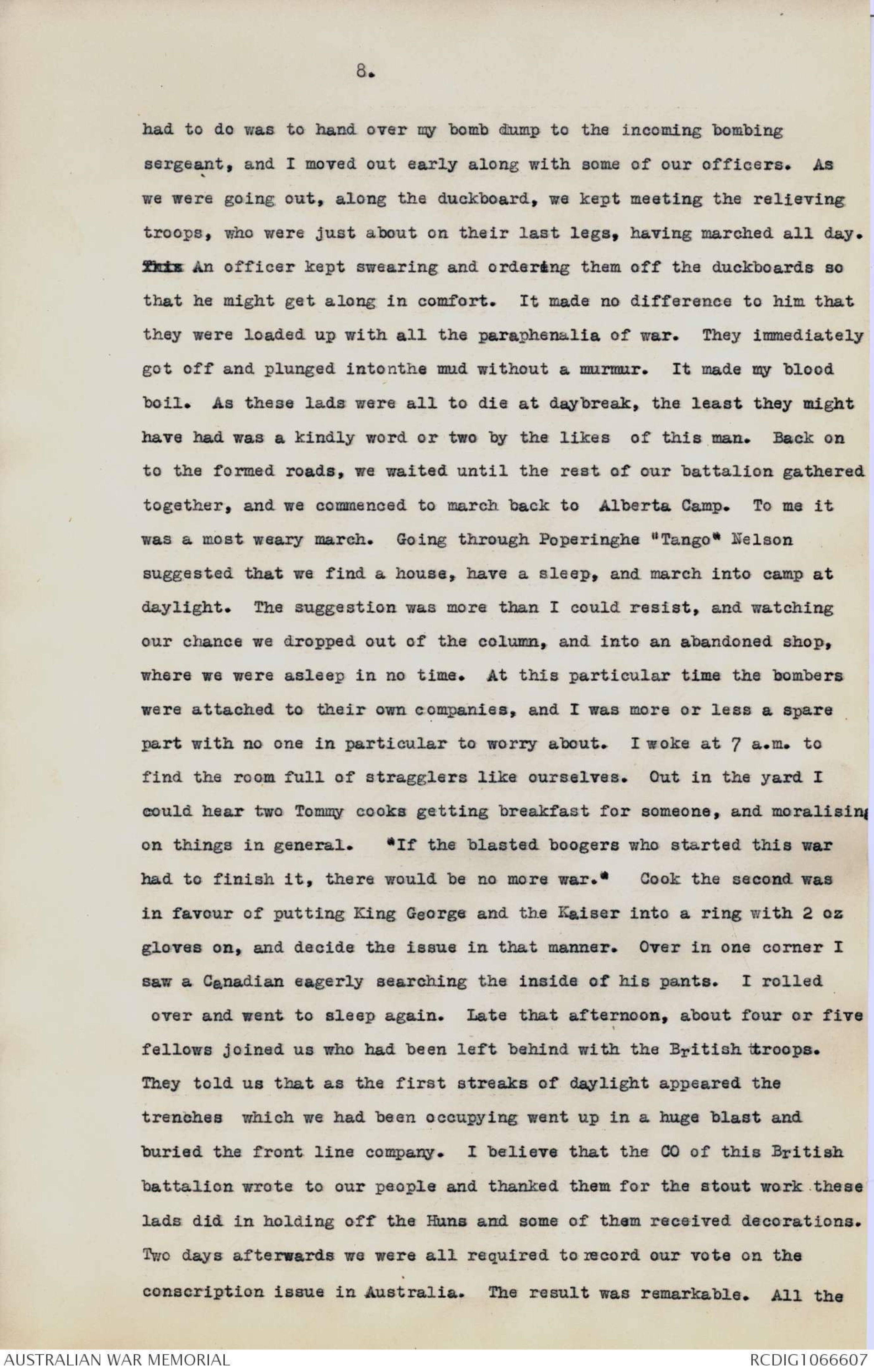
37.
but Lt. Dean and myself picked him because he was such a good man.
Our luck was out to such an extent that I never reported this
for some time, with the idea of getting out of sending any more men
up to take their place. I thought I may get into trouble over it,
but took a chance and came off all right.
Next a couple of us hunted round to see if we could find a
dugout where the rest of the survivors could get into safety. Right
opposite H.Q. we found one which was just about filled up with
Vickers gunners. When I asked them to crowd up a bit more they did
so very willingly, and the rest of us got down into it.
I went and reported to H.Q. and was told that before daylight
we would be relieved by the 16th and that we would be called. I'm
sure we never enjoyed a night's rest like that one in all our lives.
I'm sure none of them woke up once and would have slept on till goodness
knows when if they had not been wakened. Several times during
the night I came up to the top of the dugout and each time the shells
were coming over continually; but we could afford to laugh at them
now, down in the ground about 35 feet.
I woke up when it was broad daylight and went over to H.Q. and
found 16th Battalion men there. Our men had gone hours ago and forgotten
to wake us. Went back again and slept on. About 9 a.m. we
all got out and after each man had got his gear together (some of
them had to collect dead mens gear) we set out for where the battalion
were, at Wire Trench. Reached there about midday and got into
more dugouts. In the afternoon several of us reported to the "Dock"
and were sent to hospital down at xxx Boulogne.
That night some of the battalion had to go up and work for
the 16th, and had an awful time. This was the only time Captain
Teasdale Smith was in a front line trench, and he took up the working
party.
That night the 16th attacked the same places with a full coy
one to each place, and although the whole lot got into the places
they got out again just as quick as we did. I was sorry in a way, and
yet I was glad - when I remembered how the C.O. of the 16th sneered at
us.
38.
Several nights afterwards the wholemof the 13th Brigade went
at it, and they failed to take it, after losing (?) two whole companies
who were never seen again. Their casualties were terrific.
When we look back today, we can see how little our leaders
understood their jobs at that time, all through having no experience.
At the same time trained German officers were taking advantage ^of our
inexperience. To think that 50 men were asked to do what hundreds
failed to do seems ridiculous - yet it's a fact. As far as I was
concerned I never got over this lot for fully six months. During
that time the thought of the front line sent shivers me into shivers
and often at night I'd wake up and in a dazed way live some of it
all over again. I know lots were the same as I was.
Winter 1916.
On arrival at Boulogne we were loaded into ambulances and taken
out to a convalescent camp on the outskirts of the city, where life
consisted of getting our wounds dressed and idling our time away in
the Y.M.C.A. Alongside the camp was an enormous column on which
stood a statue of Napoleon gazing off towards Paris. All the information
I could find about it was that it was the camping site of his
armies with which he intended invading England. Whether this is
correct or not I do not know.
Afterwards I was paraded along with about fifty more and trucked
off to the famous "Bull Ring" at Etaples. On arrival here we found
an enormous camp which seemed to extend for miles and resembled a
bee hive as xfx far as activity went. No end of hospital buildings
and a graveyard which seemed to extend into the blue, with all the
regulation crosses in rows and rows. It made a fearful picture of
the havoc caused by the war.
This campwas one of the concentration camps for the British
Army, and here were to be seen members of almost every battalion in
the army getting finishing touches put on their training or else
being hardened after coming from hospital. Etaples itself is a
little village just a few miles from Paris Plage, a famous French
watering place. This place was a source of great joy and fuddled
heads to those who managed to visit it. Adventures with beautiful
women who lived in mansions seemed quite common experiences, and to
the young bloods who were shut off from the other sex this was the
spice of life. Could anyone blame them, for the order of the day
was "Eat, drink, and be merry, for tomorrow we die.'
On arrival at the Australian area in the camp we found that each
unit had its xxx own line of tents. We were broken up and told off
to them. On walking into the 14th Battalion lines who should I meet
but an old pal, Sergeant George Ross, who took charge of me and put
me in the tent which he inhabited. Ross was a quiet unassuming
lovable type of man whose smile endeared him to all. That afternoon
on parade all the new arrivals were told off separately, and the
C.O. of the Australian lines, Major Hector Clayton, addressed them.
In an emphatic manner he told us what he would allow and what he
2.
would not. Clayton was the most efficient camp commandant I ever
saw; to those who kicked over the traces, he dealt out punishment
just as hard as the military would allow. On the other hand those
who played the game were treated to the best conditions he could give
them, and the method worked admirably.
Along with Clayton was a Captain Williamson, who at one period
of his career was attached to the 14th Battalion. He also was as
efficient as Clayton, and the way he ran the Q.M. Department was
considered a model for others to follow. On seeing Williamson my
memory carried me back to Durrant's Post on Gallipoli. He was attached
to us at this particular period and he had a habit of silently going
around the lines at night and tapping each sentry on the shoulder and
saying in a whisper: "Is everything all right, sentry?" One night
after tapping an leaving me, he went on down a narrow sap which led
down the side of the hill towards the Turkish lines. This sap had
been dugcin the scrub, and the earth carried back over our hill and
dumped, there being no freshly dug earth lying about. No one apart
from those who were occupying it knew exactly where its position was.
Shortly after leaving me everybody within hundreds of yards were
astonished to hear a voice shout out - "Yes, everything is all right,
and the bloody password is Strawberry." This man, whose name I've
forgotten, possessed a voice which was the nearest imitation to a
ship's foghorn I've ever heard. A few nights after this incident
we had another amusing experience with the voice. This was the night
of the deluge, remembered by all late residents of the Peninsula.
It was simply a cloudburst, not rain. In a pitch black night it seemed
as if some one was emptying buckets of water over my head. The
whole of the opposinglines became nervous, and, fearing an attack,
the both sides commenced firing. What with the storm, the rattle of
machine guns, rifles, and bombs, the noise was deafening. Everybody
in our portion of the trench "stood to" and our worthy N.C.O ordered
us to maintain a slow fire down the side of the hill. This we
continued to do until the storm ceased. A few minutes after, another
storm arose, and down the side of the hill we could hear the voice
approaching up the sap bellowing like a bull. His language was past
all description, and he was looking for all the bloody ---------
3.
who had been firing into his post. Ourpost was the first to feel
his fury, and he wanted to punch the lot of us. However, our NCO
assured him that we had not been firing, and we would never dream of
firing at them. Long after we could still hear him in the adjoining
bays, looking for the bloody cows who had been firing at them. We
heard later on that bullets were showering them with mud and clods,
and they had to crouch in the bottom of the post, which was collecting
all the water from the hillside, and by what I could gather it resembled
a bath tub with the cold water tap turned full on, and the bathers
too scared to put their heads over the top.
That night George and I took a walk down the road to Etaples,
and passing a YMCA we heard a voice calling out "Repent, Repent." We
decided to go in. Inside we found about 200 rosy cheeked healthy
looking English boys and a foolish fat old man who was scaring them
out of their wits by telling them tales of the battlefields. The boys
were new reinforcements for one of the British battalions, and were
giving him a great hearing.. According to him, the battlefields were
one long string of wounded men calling on God to forgive them. This
was news to George and myself, because we had never seen anything like
it, and George, who was to die inside two weeks, did not cringe and
crawl at the last minute if I knew anything about him, but died like a
man and made no fuss about it. The last thing we heard from the
preacher was "a boy cannot ^who belonged to the Protestant faith could not go to heaven if he married a girl belonging
to the Church of Rome." This was religion with a vengeance. George
and I got up and went out. The man would have been more profitably
employed along with the rest of us making Aunt Sallies of ourselves
for the Hun to shoot at. About this time I was particularly fed up
with this sort of thing. One of my correspondents was a dear old lady
who, out of the goodness of her heart, always enclosed a tract or two
for my spiritual welfare. The last one I received was typical of many.
A wounded man lying amongst the dead and dying had his arms stretched
to the heavens and its title was - 'How Willie died on the battlefield!"
I promptly tore them to pieces and flung them away.
From here we went down to a large hut controlled by a titled lady
who in her own way sought to help and amuse the troops. That famous
4.
paper of the times, "John Bull", had done a lot of damage to the lady
and her establishment. We spent a pleasant evening there, and decided
that, whatever the lady's shortcomings and virtues were, she was good
to look at. The following day I was told off for guard duty, and
duly warned that I had a particularly bad lot to look after in the
clink. One man in particular had a habit of getting out, and through
this performance two sergeants had already lost their stripes. The
stripes did not worry me as much as the extra pay did, and I made up
my mind that it would be no fault of mine if he escaped. Marching my
guard down to the clink, I went through the usual ceremonies and duly
signed for 18 prisoners, after a very thorough counting and inspection
plus an eyeful of the troublesome gentleman. He mad e several
requests, about half of which I granted, and he appeared satisfied.
I had a good guard and they were almost as keen as I was that there
would be no escaping. At 8 p.m. the first relief was relieved by
the second, and I duly counted heads in the compound. Eighteen were
there. At 8.30 the eighteen went to bed, and I went and counted 18
again. At 9.45 after looking over my sentries I went into my tent to
get a cup of tea. Just then a man approached the tent and said,
"Serg., you had better let me get in again." Holding up my lantern,
who should I see but the man himself with an armful of goods from the
canteen. I gasped with astonishment, and pulling the key of the clink
out of my pocket I got him inside as quickly as possible, goods and
all. He thanked me and said: "You are not a bad -----, so I thought
I'd come back." How on earth he got out I could never find out. There
was only one gate. I had the only key, as far as I knew, and a sentry
stood at the gate all the time. It was impossible to scale ten feet
of barbed wire plus an overhanging fringe, and a sentry marching up
and down each side and end. The sentries were more astonished than
I was. Who can tell but what he was some showman who in these days
call themselves"escapologists". The army dragnet brought all kinds
of queer fish into its net, and I have in mind a man who was told off
to be my batman when I was doing a tour of duty in a training camp in
England. He was a professional hypnotist, and I was most uneasy about
him for a time, not knowing but that he might make a fool of me the
same as he was doing to lots of boys in the YMCA at night. I
5.
remember that one evening he had a mixed audience, and getting hold of
six of the boys he informed them that the stage on which they were
standing was covered in fine gold. Down on the floor they went, and
commenced to frantically fill their pockets, shirts, etc. In the midst
of it he informed them that it was flees and not gold that they were
filling their pockets with. A sudden change came on the scene. They
one and all commenced to discard their clothes, and before he could
get them out of their trance the last of them was out of his pants.
At another period in France I had a son of one of Australia's millionaires
for a servant.
The day on which we were trucked back to our units came at last,
and the sight of that troop train loaded to its limit with human beings
lingered long in my mind. I could not help comparing it with sheep
trains on their way to the abbatoirs. About half a dozen English girls
wre dispensing tea and cakes, and they came in for more "glad eyes'
and compliments than falls to the lot of an average girl.
Later on we were dumped off the train at some station away up in
the Ypres sector, and commenced to tramp the roads in search of our
battalions. At all the famous corners such as Hellfire, etc., we did
the usual thing, went as fast as our dignity would allow, and at last
arrived at our battalion HQ. Here a guide took us to our different
companies, and I reported to Captain Hansen. He was pleased to see
me, and told me that he had xxxx a lot of rifle grenades which he wanted
using up upon the Huns, and I could start and get rid of them tomorrow.
I found Cleary, our QM, and he found room for me in his dugout.
Next I had a look round; the place we were occupying was St. Eloi,
and a mound just over on our left was what remained of Hill 60, perhaps
one of the most famous hills in France and the scene of many awful
combats during the early stages of the war. Over our left shoulder
could be seen the city of Ypres, and in the line of vision an unusually
cemetery for the forward area.
Cleary and I were in the support trench, and it was known as the
International Trench. I was told that it had changed hands many times
during the war; at any rate it smelt like it. Next morning at standto
I went into the front line and found that our trench was about 300 yds
6.
away from the Huns on the right, and on our left we were that close
that all conversation was carried on in a whisper and all noise of any
description was suppressed. Any noisy movement brought its reward in
the shape of bombs and "rum-jars" and ^it was a nerve wracking experience
to garrison it. Added to this was the knowledge that mining and
counter-mining were going on, and any minute ^one might be given a flying
start towards his heavenly home. The effect on the nervous system of
many men was peculiar, when under intense strain such as this. All
their spare moments seemed to be taken up in urinating and it often
appeared to me that if the infantry were in for any rougher times in
future, wars the idea of discarding the presenttype of button-up
trousers and reverting to the fasion in vogue for small boys might be
given consideration. The only humorous thing about this mining was a
squad of men, usually about 6, who were told off to act as crater-snatchers,
and their duty was to be always ready to rush into a crater
directly the enemy exploded a mine and hold the enemy off until reinforced.
Our "snatchers" were the dopes of the battalion, and the only
thing they were capable of snatching was a sleep. Such jobs as this
were a god-send to the company commanders, who relieved themselves of
the nuisances. After stand-down I went out of the front line trench
by a C.T. which connected the support trench. Whether I made a noise
or not, I know not, but over came a rum-jar and exploded within 6 feet
of my head outside the trench. The concussion upset a nerve centre,
and I found it was impossible to balance myself, and it was with great
difficulty that I managed to walk about for 4 hours. In the afternoon
I went to work on the rifle bombs. I found a machine in which to screw
four rifles; there was a range table, and on firing a round they almost
lobbed on our front line trench. Ranging on the Hun line I went for
my life, and used up a lot of the bombs, thankful that no retaliation
was forthcoming. My nerves were badly rattled by the"rum-jar" and I
was thankful when I had finished my job.
Lieutenant Harold Walklate was the hero of the line. He had charge
of the Stokes mortar battery, and he made it a rule in his squad that
for every offensive thing that the Hun fired across at us, they pelted
back four in return. Unlike a lot of Stokes mortar artists, Walklate
7.
would walk up into the front line and take the back chat along with the
infantry. This was appreciated. One rum-jar battery in the Hunnlines
was proving very objectionable, and Walklate made up his mind to rub
it out. He watched for a long time before its position was located,
then ranging on it he waited. The following night as soon as the crew
commenced firing, Walklate saw the sparks and opened on it. Those who
were watching said that as the second rum-jar emitted sparks on being
fired, Walklate's first dropped right on top of it and blew it up.
Dodging rum-jars proved a very exciting occupation. As the things came
tumbling through the air they were very easily seen, and of course every
one would make himself as small and as scarce as possible. The wily
Hun would send one over and drive all the occupants to either flank.
Waiting until they had moved far enough, he would send another into
the locality of their new home and drive them back again. This business
of running to and fro caused no end of grim fun, and was not altogether
relished. By what I was told this was how my pal George Ross was
killed.
Behind us we had a Belgian battery and its firing caused xxxxx
no end of sarcastic remarks. Very rarely would their shells explode,
and we could hear them drop into the German lines with a flop. We were
told that it was some of the American ammunition and why the Belgians
wasted time and energy on it was a puzzle to us.
The weather was bad at this time, drizzling rain etc., and everything
was slimy and slippery. The boys I pitied most were the lads
told off for patrol. The lines being close together, they had to hug
the ground, and they were in a mess when they came in. To my surprise
a post was put out in front of the trench which was so close to us.
The boys crawled out on their bellies into a shellhole just outside
the parapet, peering over the rim of it. They knew only too well what
they would receive if they betrayed themselves. One patrol, I remember,
took out several engineers, who jammed steel pegs into the ground to
try and detect the Huns digging underground. Whether they discovered
anything I do not know, but if we had only known it we were then standing
over loaded mines.
One drizzly night we were ordered to pack up and get ready to move
out. With the order, came the relieving British battalion. All I
8.
had to do was to hand over my bomb dump to the incoming bombing
sergeant, and I moved out early along with some of our officers. As
we were going out, along the duckboard, we kept meeting the relieving
troops, who were just about on their last legs, having marched all day.This An officer kept swearing and ordering them off the duckboards so
that he might get along in comfort. It made no difference to him that
they were loaded up with all the paraphenalia of war. They immediately
got off and plunged intonthe mud without a murmur. It made my blood
boil. As these lads were all to die at daybreak, the least they might
have had was a kindly word or two by the likes of this man. Back on
to the formed roads, we waited until the rest of our battalion gathered
together, and we commenced to march back to Alberta Camp. To me it
was a most weary march. Going through Poperinghe "Tango“ Nelson
suggested that we find a house, have a sleep, and march into camp at
daylight. The suggestion was more than I could resist, and watching
our chance we dropped out of the column, and into an abandoned shop,
where we were asleep in no time. At this particular time the bombers
were attached to their own companies, and I was more or less a spare
part with no one in particular to worry about. I woke at 7 a.m. to
find the room full of stragglers like ourselves. Out in the yard I
could hear two Tommy cooks getting breakfast for someone, and moralising
on things in general. "If the blasted boogers who started this war
had to finish it, there would be no more war." Cook the second was
in favour of putting King George and the Kaiser into a ring with 2 oz
gloves on, and decide the issue in that manner. Over in one corner I
saw a Canadian eagerly searching the inside of his pants. I rolled
over and went to sleep again. Late that afternoon, about four or five
fellows joined us who had been left behind with the British troops.
They told us that as the first streaks of daylight appeared the
trenches which we had been occupying went up in a huge blast and
buried the front line company. I believe that the CO of this British
battalion wrote to our people and thanked them for the stout work these
lads did in holding off the Huns and some of them received decorations.
Two days afterwards we were all required to record our vote on the
conscription issue in Australia. The result was remarkable. All the
 Sandy Mudie
Sandy MudieThis transcription item is now locked to you for editing. To release the lock either Save your changes or Cancel.
This lock will be automatically released after 60 minutes of inactivity.